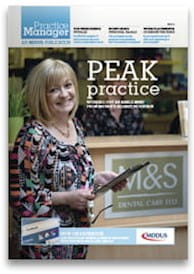
SUMMER is approaching and many practices can expect to receive a number of requests for work experience from would-be doctors and dentists, as well as other healthcare professionals.
MDDUS sees an increase in advice calls on this topic at this time of year from practices who are unsure how best to deal with such requests. For senior school pupils whose ambitions lie in the fields of medicine or dentistry, experience in a caring or service role, as well as direct observation of healthcare, are often a compulsory part of application processes. Similarly, other healthcare professionals may seek a placement to enhance their CV and assist with their career progression.
Before reaching a decision on any request for a work placement, practices should be aware of the various risk factors involved.
HEALTH AND SAFETY
It is important to note that anyone who is participating in work experience is regarded as a practice employee for the purposes of health and safety legislation. This means the level of employer’s liability insurance will have to be checked and, if necessary, increased. It is also worth remembering that certain health and safety requirements – such as the need to record risk assessments in writing or have a qualified first-aider – become active above a threshold number of employees, so the addition of students or other clinicians to the workforce could have quite onerous practical implications.
You should also be aware that the law defines those under 18 years of age as "young people" and, as such, their employment must be preceded by a risk assessment which takes into account their lack of maturity, knowledge and ability to recognise danger. It is advisable to record the results of this assessment. Where prospective work-shadowers are aged under 16, the findings of your assessment must be put in writing and a copy given to their parents or legal guardians. Many practices choose to impose a minimum age limit of 16 for patient observations, but this is up to the discretion of each practice.
All hazards, even the apparently mundane ones such as those posed by surface cleaning products, should be assessed with a view to eliminating or at least minimising the risks they pose. Clearly dental and medical surgeries are fraught with potential dangers unique to the clinical setting and will therefore demand careful attention. The Health and Safety Executive has a useful advice booklet called The Right Start. Work experience for young people: Health and safety basics for employers.
REFERENCES
It may be worthwhile asking student applicants for a reference from their school to confirm that a career in the medical or dental field, or similar, is realistic, and that the school has no issues or concerns about their suitability for placement.
CONFIDENTIALITY
Before beginning their placement, it is extremely important that candidates are given clear, detailed guidance on confidentiality. This should include the fact that the patient’s attendance in itself, or personal details such as address/clinical complaint, are entirely confidential. This should be reinforced by a confidentiality agreement, to be signed by the candidate, which makes it clear that the work placement will be terminated if the agreement is broken. Consider, for example, the security of clinical records and where/how they are stored. MDDUS is aware of one case where a work placement student who said he was going to use the toilet instead let himself into the unlocked room where patient notes were kept and was found a short time later looking through confidential files.
Where possible, it is advisable not to accept work experience students who live in the local area to minimise the risk of them recognising a patient, or indeed being tempted to look for personal information relating to friends or relatives.
CONSENT
Express consent (either verbal or in writing where appropriate) must be sought from patients before they are treated or examined in the presence of someone on work placement. Patients should be told they can change their minds at any time, in which case the candidate should leave immediately and without protest. Practices could consider displaying an information poster in the waiting areas to allow patients to consider this.
HANDS OFF
If a practice decides to accept a request for work shadowing, it should be made clear that there will be no opportunity for "hands-on" experience. They should be aware they will be present in a purely observational capacity, and will be expected to conduct themselves in a proper manner. In a medical setting, students would not be expected to witness any examinations where a patient is required to undress.
It may be helpful to ensure that the student/healthcare professional has realistic expectations of what they will be able to do during their placement with the practice. Consider drawing up a timetable of suitable activities for them, including time with various members of the practice team. They must appreciate they are in a sensitive environment where they will have to work within limits and will not have access to everything that is going on. Afterwards, practices may find it helpful to seek feedback via an evaluation form to help inform any future placements.
Jill Thomson is a practice adviser at MDDUS
This page was correct at the time of publication. Any guidance is intended as general guidance for members only. If you are a member and need specific advice relating to your own circumstances, please contact one of our advisers.
Read more from this issue of Practice Manager

Save this article
Save this article to a list of favourite articles which members can access in their account.
Save to library

